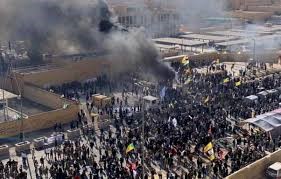Shutter the Gigantic US Embassy in Iraq

This week, amid protests by people upset with United States intervention in Iraq, individuals forced their way into and damaged the US embassy compound in Baghdad. In response, US Secretary of Defense Mark Esper declared on Tuesday that 750 additional US troops would be deployed immediately to the Middle East, and it was reported that anonymous US officials said thousands more could be sent there soon.
Here is another option to consider: End US intervention and sanctions, along with the threat of both, that stir up resentment toward the US in Iraq and elsewhere. Announcing the relocating and major downsizing of the huge US embassy in Iraq would help show the US is serious about following through.
If the US embassy in Iraq were intended to accomplish peaceful and diplomatic tasks, it would be much smaller, in line with the size of other embassies in countries with similar characteristics in areas such as population size and levels of trade and travel between them and America. Instead, in Baghdad the US has its largest embassy, even larger than US embassies in Mexico and Canada, two countries that share long borders with America and have very much larger amounts of trade and travel between them and America.
Built by the US government after the 2003 US invasion of Iraq, the US embassy in Baghdad is an important part of the continuing US government effort to exert control in the country and the larger region. Indeed, then-US House of Representatives member Ron Paul (R-TX) included the continuing presence of the gigantic embassy in Baghdad as part of his explanation of why President Barack Obama’s 2011 announcement of the withdrawal of some US troops from Iraq was of much less significance than many reports then suggested. Paul wrote in a November of 2011 editorial:
Some 39,000 American troops will supposedly be headed home by the end of the year. However, the US embassy in Iraq, which is the largest and most expensive in the world, is not being abandoned. Upwards of 17,000 military personnel and private security contractors will remain in Iraq to guard diplomatic personnel, continue training Iraqi forces, maintain “situational awareness” and other functions. This is still a significant American footprint in the country.
Eight years later, the embassy remains and rampant US intervention in both Iraq and the larger region persists. Instead of continuing the policy of intervention, President Trump could implement the policy reversal Paul endorsed in his editorial. Paul wrote: “I have long said that we should simply declare victory and come home.” That would be nice. However, escalation appears to be in the cards.
*
Note to readers: please click the share buttons above or below. Forward this article to your email lists. Crosspost on your blog site, internet forums. etc.
Featured image is from The Ron Paul Institute for Peace and Prosperity

